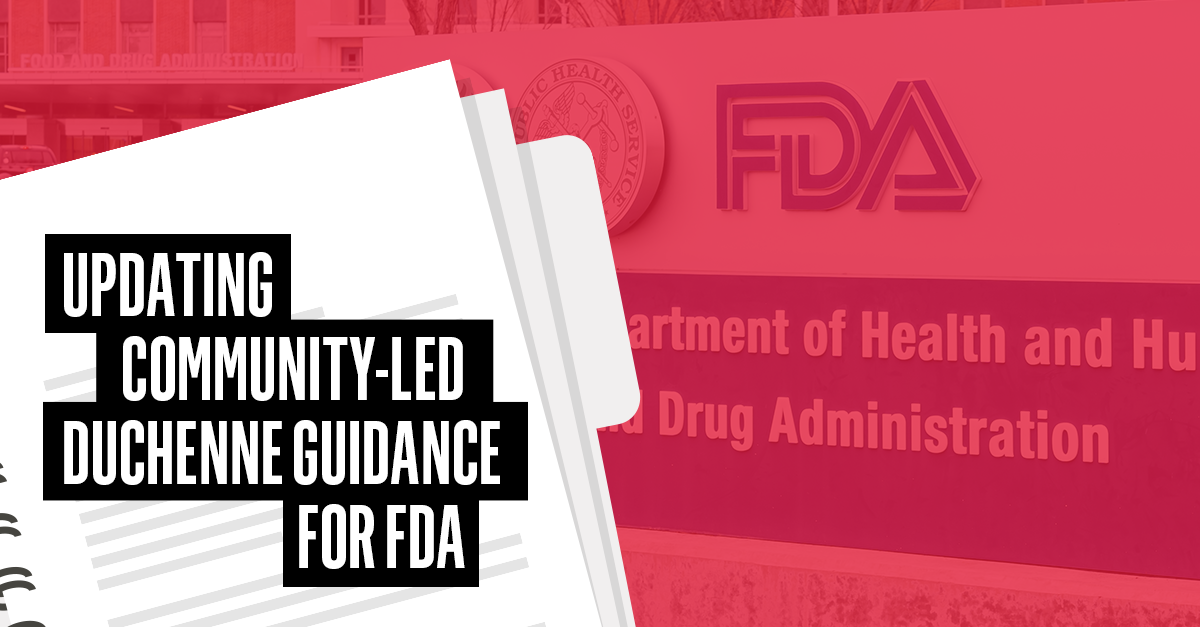
PPMD takes every action necessary to ensure therapies are developed efficiently and that they include the voice of the community.
In 2014, we came together as a community, creating and submitting to the FDA the first-ever patient advocacy-initiated Duchenne Guidance for developing therapies to help accelerate drug development. In 2018, the FDA finalized their own Duchenne Guidance, and the drug development pipeline subsequently expanded.
Since then, we’ve made a great deal of progress and now need to revisit the landmark document to ensure it reflects both scientific and procedural progress, including advancements in cardiology and gene therapy. This will help drive even more innovation in Duchenne and Becker, as well as carve a path toward our ultimate goal of accessible therapies for all patients.
And we need your help to get there.
Developing the First Community-Led Guidance
The 2014 Community-Led Duchenne Guidance historically marked the first time a disease-specific advocacy group engaged its community to lay out a structure for companies developing therapies, so that they may clearly understand the disease, what is important to patients, and what is required by regulatory agencies to determine the safety and effectiveness of a therapy. The document became a ‘playbook’, informing companies and FDA about the evolving drug development landscape for Duchenne and Becker, as well as the patient focused views of benefit expectations and risk tolerance of our community.
Together, our community’s collective efforts incentivized Duchenne drug development and provided a roadmap for innovation.
Now, more than 45 companies have included Duchenne and Becker in their pipeline. Some targeting the primary cause of Duchenne by restoring or replacing production of the dystrophin protein. Other companies have focused on altering the downstream effect of the loss of dystrophin.
Since 2014 a lot has changed. Our community has experienced trial and regulatory successes with five drug approvals, as well as difficult disappointments with several study terminations. As the field has evolved, so has our understanding and learnings about what to do differently moving forward.
With Duchenne gene therapy clinical trials currently underway, we also must ensure these learnings are shared with different centers and divisions within the FDA. Previously, all Duchenne trials and approvals were submitted for review to the Center for Drug Evaluation and Research (CDER), the FDA’s lead center for regulation of human drugs. Now, as we enter the gene therapy space, the FDA’s Center for Biologics Evaluation and Research (CBER), the center responsible for reviewing gene therapies, has also been interacting with our community. With so much learned through prior interactions with CDER, we need to ensure cross-talk from CDER to CBER and to industry sponsors so that our shared learnings and discussions around outcomes, challenges, pathways for approval, and patient preferences are well known and well understood when the agency is evaluating these promising potential therapies.
Because of so many advancements in knowledge, understanding, care, clinical trials, and approvals, it is important to now “modernize” the Community-Led Guidance of 2014 to reflect this new landscape in Duchenne and Becker therapy development.
Developing a New Community-Led Guidance: How You Can Help
Similar to the 2014, PPMD has formed a Steering Committee and Working Groups of over 80 stakeholders. A critical component of this process is forming a Community Advisory Board (CAB).
The CAB will consist of people living with Duchenne and Becker, caregivers, and other patient organizations and foundations. The CAB will be tasked with reviewing proposed updates to the Community-Led Guidance document and providing feedback along the way.
If you are a community member interested in participating on the CAB, please contact PPMD’s Ryan Fischer at ryan@parenprojectmd.org for more information, including required time commitments.
As we work through the development of the new Community-Led Guidance, we will keep you updated on the progress of the document and provide opportunities for public comment to allow for broad scale participation.
PPMD believes in the power of convening our voices, with patients and caregivers at the center of all discussions. With much more work to be done, we are grateful for your help in this important effort.



 by: Parent Project Muscular Dystrophy
by: Parent Project Muscular Dystrophy

